Erstellt am: 1. 5. 2009 - 14:03 Uhr
The Art of Czech Cheekiness
The artist David Czerny breezed into the low-beamed café in Prague’s Mala Strana district, casually leant his mountain bike against a wooden cabinet and, Pilsner beer in hand, plonked himself down opposite me with the easy smile of someone who is sure of his charms - someone who knows you are going to like him. I did, immediately. But then I’m not Bulgarian.
This is the charismatic enfant terrible of the Czech art scene; a veteran of the peaceful protesters of Wenceslas Square who helped bring down nearly half a century of Soviet domination without firing a shot. Czerny is the man who painted a Soviet tank, left displayed as an austere memorial, a lavish pink. He is also the man who sent giant babies climbing up to Zizkov television tower, who mocked, via sculpture, the “good king" Wenceslas by seating him on an upside down dead horse, and who, much to my delight, posted two computer controlled cyber-men outside the Kafka museum to write famous literary quotes in watery “piss".
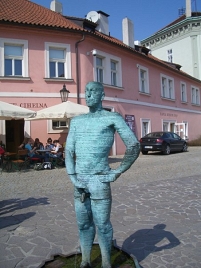
chris cummins
But his latest escapade in cheekiness has overshadowed all of that. Indeed, even by the admission of the Czech ambassador to the EU, it will be one of the most remembered features of the current calamitous Czech rotating presidency of the bloc.
Entropa
Asked to direct a sculpture to decorate the lobby of the European Council, to be unveiled to celebrate the beginning of the Czech Presidency, David Czerny created a complicated puzzle-like installation, called “Entropa". It is composed of 27 small pieces each symbolizing a member country – just the sort of thing you’d imagine that Brussels would love. But cultural flattery, it turned out, was clearly not on Czerny’s agenda. On his wonky, alternative map, the artist represented the Netherlands by a few minarets peeping out from the rising flood waters, while five Lithuanian soldiers were seen to be peeing on Russia. Little Luxemburg, meanwhile, was a nugget of gold marked by a “for sale" sign. Hilariously, Britain, that stubborn old island, was missing completely from Czerny’s map, while Romania was shown as a vampire-themed amusement park. Austria, by the way, is a row of nuclear power plants - perhaps an ironic comment on Vienna's vehement opposition to Temelin?
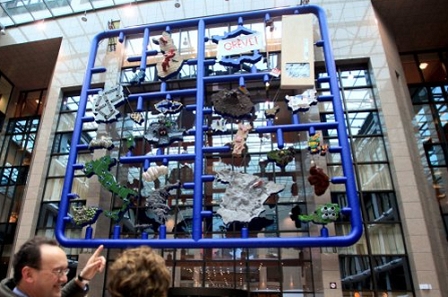
EPA/OLIVIER HOSLET
Most controversially, however, was Czerny’s depiction of Bulgaria as a series of crude, hole-in-the-floor toilets. Bulgarian officials were furious, Czech diplomats were summoned in Sofia, and the hapless Czech deputy prime minister, Alexandr Vondra, who had been anticipating a very different sort of sculpture, was obliged to read out a hilariously grovelling apology ahead of the officially unveiling. An inauspicious start for the Czech Republic’s first ever EU Presidency.

EPA/OLIVIER HOSLET
Teaching Europe To Laugh at Itself
In Entropa the EU, that once utopian project, appears in a ridiculous light. As Czerny is Czech, a nationality that has become, for many, synonymous with EU scepticism, I wondered whether he intended his project as an attack of the overweening ambition of Brussels. “No!" He erupted, clearly disturbed by this often repeated misinterpretation “No! I am very pro-European. It was never meant that way!" He pointed out that he had actively supported the “Yes for Europe" campaign ahead of accession 5 years ago.
Instead, he explained, the art-work is an attack on our easy-to-fit European categorisation that leads us for example, to label Czechs as eurosceptics. Czerny and his friends sat together and discussed the clichés about the various countries and painful lack of knowledge we have about our ‘partner countries’. It’s our cultural ignorance that is being mocked, not Europe. Indeed I have to admit I know more of the politics and culture of Australia than I do of Slovakia, a country’s whose capital I can reach in an afternoon’s bike ride. Besides, he added, he wanted to see whether Brussels, that warren of grey-suits and fat documents, would have enough spirit to laugh at itself. “And what no-one mentions in the international press, “he complains, “is that it is a fine sculpture. You can’t see that on the internet pictures!"
Vaclav Klaus and Euroscepticism
The Czech reputation for euro-scepticism is largely attributable to the words of one man, the c headstrong, pencil-moustached President Vaclav Klaus - a man who called, in 2005, for the EU to be scrapped and has since, with strong verbal attacks on US President Barack Obama, French President Nicolas Sarkozy and anyone in favour of tackling climate change, been a regular feature in global head-lines. “He has hijacked the views of 70% of the country," moans Czerny. Among the young Czechs I spoke to in the cafés of Prague feared their President was turning their country towards the East.
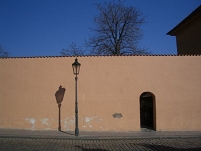
chris cummins
It’s a view shared by Petr Kratochvil, of the Czech Institute of International Relations, who I met in a gothic office opposite the castle. He has been studying Klaus’ position on Kosovo, energy security, European integration and the US missile defence shield and has concluded that, in every day politics his views are “almost identical to those of Russia"
With a wry smile, Kratochvil told me an anecdote of a Czech trade delegation to Russia headed by Klaus that was told by the President, much to their horror, that they must only speak Russian to their counterparts. “It caused an almost hysterical reaction. Many of the Czech delegation didn’t speak a word of Russian!"
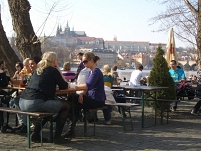
chris cummins
Warily Happy
Although there is still a understandable wariness of forfeiting Czechs’ national sovereignty, hard-won twenty years ago after more than 40 years of Soviet domination, I didn’t come across much note-worthy euroscepticism in my industrious trawls through Prague’s sun-drenched café life.
Instead, I experienced sort of complacent indifference I’ve heard before in Vienna, or Paris or London. While unwilling to extol the bloc’s virtues, most people recognised that life had improved, if gradually, in the 5 years since their country’s accession. The "no" camp had gained a full 20% of the vote ahead of that move but, 5 years on, no-one I met even remotely suggested they would like the Czech Republic to pull out now. Still I was among the young urban elite in Prague, which has quickly advanced to one of the wealthiest regions of the EU, while Petr Kratochvil reminds that some areas of northern Moravia and Bohemia have lagged far behind and people there have been left disillusioned.
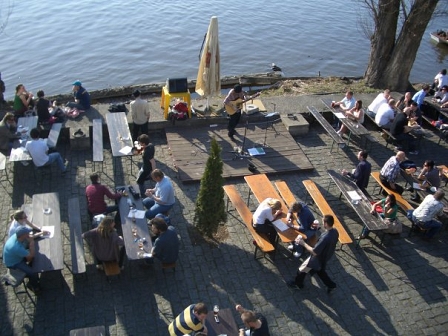
chris cummins
Yet for a visitor to Prague in the glistening spring of 2009, it is hard to believe that the city was behind the Iron Curtain a single generation ago and that it hasn’t belonged to the EU for longer. The roads are clean, the trams are new and immaculate, the shops are open all hours, and almost everyone speaks English. I seem to visit in 5 year cycles, starting with what I naively considered my ‘Eastern adventure’ at the end of the 1990’s.
Now, a decade on, the idea that I was travelling East from Vienna made as little sense symbolically as it has always done geographically.
I mentioned this to Petr Kratochvil. “Maybe we Czechs should all leave and come back," he smiled. “Then we we’d also see the progress and stop grumbling."


